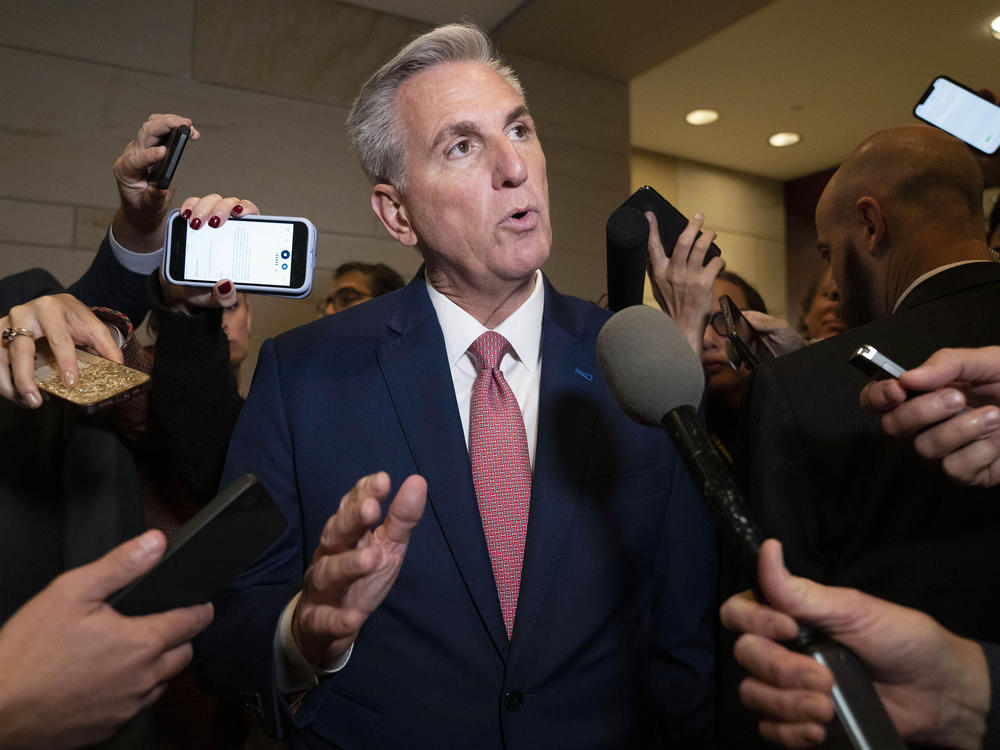Loading...
Section Branding
Header Content
McCarthy nominated speaker in internal GOP vote but he faces conservative resistance
Primary Content
Updated November 15, 2022 at 6:25 PM ET
House Minority Leader Kevin McCarthy was nominated by House Republicans to serve as Speaker of the House when the new session of Congress starts in January, even as control of the chamber remains unclear.
The California congressman was nominated by 188 – 31, an aide to McCarthy tells NPR.
With some GOP lawmakers voting for his challenger, Arizona Rep. Andy Biggs, a conservative member of the House Freedom Caucus, McCarthy faces a challenge uniting a fractured conference that is still reeling from disappointing midterm election results.
"We have our work cut out for us," McCarthy told reporters after the vote. "[We're going to] have a small majority, we've got to listen to everybody in our conference."
Tuesday's closed-door caucus vote was the first step on McCarthy's path to presiding over the House chamber. The California Republican needs to be elected by a majority of all members who vote at a public vote on the House floor on January 3. The next seven weeks will be a test of his ability to win over those who called for a major leadership shakeup. But McCarthy voiced confidence that he would secure 218 Republican votes by January.
"We'll work together and we'll get there," McCarthy said.
After McCarthy and other top House Republicans vowed a red wave in the 2022 midterms some conservatives are demanding operational changes to make the legislative process more transparent.
Control of the House is unclear with several races still uncalled a week after the election. But the GOP is on track to eke out a majority — one in the single digits. Heading into the official vote next year McCarthy can't afford to lose more than a couple votes. If his opponents mount a challenge on the floor the process could turn messy and be a sign of a tumultuous GOP majority torn between hard liners on the right who refuse to compromise and more mainstream members who believe voters sent them to Washington to show they can govern.
Florida Rep. Matt Gaetz was one member who did not vote for McCarthy on Tuesday, and he vowed that he wouldn't vote for him in January either.
"Kevin McCarthy couldn't get to 218 votes today. Couldn't get to 200. Couldn't get to 190. So to believe that Kevin's going to be speaker, you have to believe he's going to move votes in the next six weeks that he couldn't move in the last six years," Gaetz said.
Previous candidates for speaker like Rep. Paul Ryan and Rep. Nancy Pelosi also faced challenges in their internal party votes, but later prevailed on the floor. Several Republicans predicted that those who wanted to vent or protest the election results would ultimately come around and back McCarthy.
Oklahoma GOP Rep. Tom Cole, an ally of McCarthy's outlined the case for him to take the gavel, saying he's proven he can effectively handle the role.
"The guy has added seats every time he's been our leader," Cole said. "He's our best strategist, he's our best fundraiser, he's our best candidate recruiter. Isn't that the guy you want to lead you? I think so."
Copyright 2022 NPR. To see more, visit https://www.npr.org.

